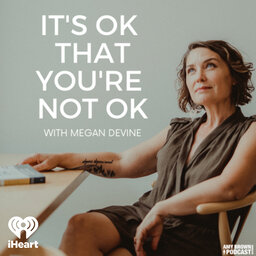Do You Have to Be Friends with Everyone? with Dr. Alexandra Solomon (Part Two)
What should you do if someone wants to be friends, but you’re not into it? Boundaries are part of all human relationships, but they are TRICKY.
Welcome to part two of our show about boundaries - how to make them, how to keep them, and sometimes, how to breach them - with special guest Dr. Alexandra Solomon, host of Reimagining Love.
In this episode we cover:
- Starting over in a new place with new friends
- Why we so often confuse boundaries with being mean or rude
- The power of social observation to gather data (Megan’s go-to move!)
- Scripts for saying “no thank you” to a potential friendship when that feels both mean and necessary
We're re-releasing some of our favorite episodes from the first 3 seasons. This episode was originally recorded in 2022.
Looking for a creative exploration of grief? Check out the best selling Writing Your Grief course here.
About our guest:
Dr Alexandra Solomon is one of the most trusted voices in the world of relationships. She’s a licensed clinical psychologist at The Family Institute at Northwestern University and the author of two bestselling books: Loving Bravely and Taking Sexy Back.
You might know her from her popular instagram channel @dr.alexandra.solomon, or from her podcast, Reimagining Love. Find her at dralexandrasolomon.com
About Megan:
Psychotherapist Megan Devine is one of today’s leading experts on grief, from life-altering losses to the everyday grief that we don’t call grief. Get the best-selling book on grief in over a decade, It’s Ok that You’re Not OK, wherever you get books. Find Megan @refugeingrief
Additional Resources:
Want to train with Dr. Solomon? Check out her current training courses at dralexandrasolomon.com
Want to talk with Megan directly? Join our patreon community for live monthly Q&A grief clinics: your questions, answered. Want to speak to her privately? Apply for a 1:1 grief consultation here.
Check out Megan’s best-selling books - It’s OK That You're Not OK and How to Carry What Can’t Be Fixed
Books and resources may contain affiliate links.
Follow our show on Instagram, Facebook, Twitter, and TikTok @refugeingrief and @itsokpod on TikTok.
For more information, including clinical training and consulting and to share your thoughts, visit us at refugeingrief.com
 It’s OK That You’re Not OK with Megan Devine
It’s OK That You’re Not OK with Megan Devine


